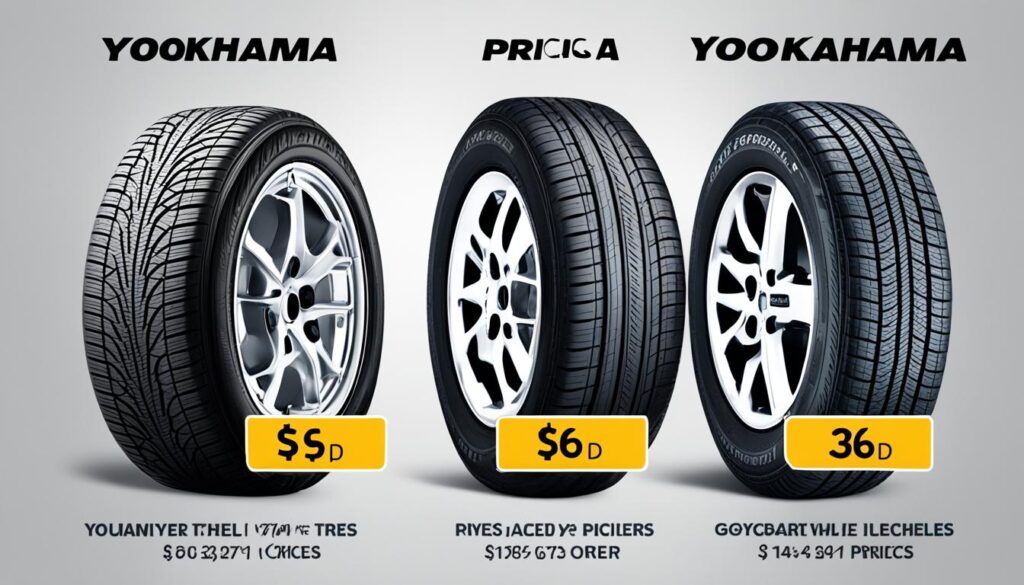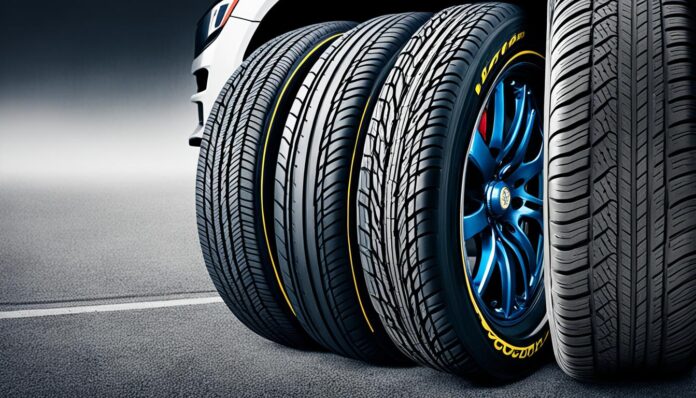As an Amazon Associate, I earn from qualifying purchases
When it comes to choosing the best tires for your vehicle, two popular brands worth considering are Yokohama and Goodyear. Both brands have built a reputation for delivering high-quality tires that offer superior performance and value. In this article, we will compare Yokohama tires and Goodyear tires to help you make an informed decision about which brand is the best pick for your ride.
Key Takeaways:
- Yokohama and Goodyear are well-known tire brands known for their durability and performance.
- When it comes to performance, both brands offer good steering and grip on dry and wet roads.
- Goodyear tires have puncture-resistance features and a longer tread life, while Yokohama tires excel at producing less noise and vibrations.
- In terms of pricing, Yokohama tires are generally more budget-friendly compared to Goodyear tires.
- Both brands offer warranties, but Goodyear offers a road hazard warranty that is not available with Yokohama.
About the Companies
When it comes to tire manufacturers, Yokohama and Goodyear have established themselves as industry leaders. Let’s take a closer look at each company and what sets them apart.
| Yokohama | Goodyear |
|---|---|
| Yokohama is a tire brand that was established in 1917 in Japan. They have a rich history of producing high-quality tires for a variety of vehicles, including SUVs, trucks, passengers, and racing cars. | Goodyear is an American tire company that has been around since 1898. They are known for their innovative technology and wide range of tire options for different types of vehicles. |
| Yokohama has production facilities on three continents, ensuring that they can meet the demands of customers around the world. | Goodyear also has a global presence, with manufacturing facilities in multiple countries to cater to the needs of a diverse customer base. |
| Yokohama is renowned for their commitment to high-performance products. They offer a diverse lineup of tires that cater to different driving needs, including all-season, summer, winter, and performance tires. | Goodyear is known for their tire technology advancements, delivering tires that offer exceptional grip, durability, and performance on various road conditions. |
Both companies strive to provide top-quality tires that exceed customer expectations. Understanding their history and reputation can help you make an informed decision when selecting the right tires for your vehicle.
Performance Comparison
When it comes to performance, both Yokohama and Goodyear offer impressive capabilities on dry and wet roads. However, there are some differences that set them apart. Let’s take a closer look at the key aspects of their performance:
Dry Performance
Both Yokohama and Goodyear tires provide excellent steering response and grip on dry surfaces, allowing for enhanced control and maneuverability.
Wet Performance
When it comes to wet roads, both brands excel in delivering superior traction and handling. The advanced tire technology implemented by Yokohama and Goodyear ensures improved water evacuation, reducing the risk of hydroplaning and enhancing overall safety.
Puncture-Resistance
Goodyear tires are designed with puncture-resistance features, providing added durability and protection against potential road hazards. These tires are built to withstand tough conditions, reducing the risk of flats and other damage.
Noise Levels and Vibrations
Yokohama tires are known for their exceptional noise reduction capabilities, which contribute to a quieter and more comfortable driving experience. The innovative tire construction and tread design of Yokohama tires help minimize road noise and vibrations, ensuring a smoother ride.
Durability
In terms of durability, Goodyear tires offer a significant advantage. With their robust construction and quality materials, they are built to last, providing long-lasting performance and reliability even in challenging driving conditions.
| Performance Aspect | Yokohama | Goodyear |
|---|---|---|
| Dry Performance | Excellent | Excellent |
| Wet Performance | Superior | Superior |
| Puncture-Resistance | No | Yes |
| Noise Levels and Vibrations | Low | Varies |
| Durability | Varies | High |
While Yokohama tires offer impressive dry and wet performance with reduced noise levels, Goodyear tires stand out with their puncture-resistant features and exceptional durability. Consider your priorities and driving conditions when choosing between these two brands.

Price Comparison
One of the key factors to consider when choosing tires is the price. In this section, we will compare the prices of Yokohama and Goodyear tires to help you make an informed decision.
Yokohama Tires Price
Yokohama tires are known for being budget-friendly and affordable. Their pricing is generally lower compared to Goodyear tires, making them an attractive option for cost-conscious consumers.
Goodyear Tires Price
On the other hand, Goodyear tires are often priced higher than Yokohama tires. While they may come with a premium price tag, Goodyear tires are known for their quality and durability.
It’s important to note that the price difference may vary depending on the type and size of tires. It is recommended to check the specific models and sizes that fit your vehicle to get an accurate comparison.
| Tire Brand | Price Range |
|---|---|
| Yokohama | Affordable |
| Goodyear | Higher pricing |
As shown in the table above, Yokohama tires offer a budget-friendly option, while Goodyear tires tend to have higher pricing. Ultimately, the choice between the two brands will depend on your budget and the specific tire models that meet your requirements.

Warranty Comparison
When purchasing tires, it’s important to consider the warranty offered by the manufacturer. Both Yokohama and Goodyear provide warranties to ensure customer satisfaction and peace of mind. Let’s compare the warranty details for these two tire brands.
Warranty Length
Both Yokohama and Goodyear offer warranties with a length of up to 6 years or up to 80,000 miles. This means that during this period, any malfunctions in materials or workmanship will be covered by the warranty.
Standard Limited Warranty
The standard limited warranty provided by both Yokohama and Goodyear covers manufacturing defects in the tires. If you encounter any issues due to faulty materials or workmanship, the manufacturer will repair or replace the tires within the specified warranty period.
Tread Life Warranty
Yokohama and Goodyear also offer a tread life warranty, ensuring that their tires perform optimally for a certain duration. This warranty guarantees that the tires will maintain a certain tread depth for an extended period, offering long-lasting performance and safety.
Road Hazard Warranty
While Goodyear offers a road hazard warranty, it’s important to note that Yokohama does not provide the same coverage. A road hazard warranty protects against damage to the tires caused by road hazards such as potholes, nails, and debris. It provides added reassurance by covering the cost of tire repair or replacement in such situations.
“Both Yokohama and Goodyear offer warranties to protect your tire investment. While Yokohama provides a standard limited warranty and a tread life warranty, Goodyear goes the extra mile by also offering a road hazard warranty. Consider your driving conditions and the likelihood of encountering road hazards when making your tire selection.”
| Warranty Type | Yokohama | Goodyear |
|---|---|---|
| Standard Limited Warranty | ✓ | ✓ |
| Tread Life Warranty | ✓ | ✓ |
| Road Hazard Warranty | N/A | ✓ |
While Yokohama doesn’t offer a road hazard warranty, their other warranties provide sufficient coverage for general tire issues. On the other hand, Goodyear’s inclusion of a road hazard warranty offers added protection for unexpected damages caused by road hazards.
Now that we’ve explored the warranty details of both Yokohama and Goodyear, let’s move on to the pros and cons of each brand.
Pros and Cons
When considering Yokohama and Goodyear tires, it’s important to weigh the strengths and drawbacks of each brand. Here are the pros and cons of both:
| Yokohama Tires | Goodyear Tires |
|---|---|
| Pros: | Pros: |
|
|
| Cons: | Cons: |
|
|
As shown in the table above, Yokohama tires offer affordability, a long warranty, a variety of tire lineups, eco-friendly technology, good steering and grip, and less noise and vibrations. However, they may have limited availability and are less durable compared to other brands.
On the other hand, Goodyear tires provide high quality and durability, puncture-resistance features, a longer tread life, a wide range of options, and good steering and grip. However, they may produce more road noise.
Consider your priorities and driving needs when choosing between these two brands to find the tires that best suit your preferences.
Popular Tire Models
When it comes to popular tire models, Yokohama and Goodyear offer a wide range of options that cater to different driving needs and preferences.
Yokohama has six distinct tire lineups, each designed to deliver excellent performance in specific conditions. These lineups are:
- ADVAN: Known for their high-performance capabilities, ADVAN tires are suitable for sports cars and luxury vehicles. They offer exceptional traction, precise handling, and enhanced stability.
- Avid: Avid tires are designed for passenger cars and provide a comfortable and smooth ride. They offer good fuel efficiency and have low rolling resistance.
- Geolandar: Geolandar tires are ideal for SUVs and trucks. They are built to tackle various terrains, including off-road conditions, while providing excellent traction and durability.
- Ice Guard: Ice Guard tires are specifically designed for winter conditions. They offer superior grip on snow and ice, ensuring safer driving during cold and icy weather.
- PARADA: PARADA tires are known for their sporty appearance and performance. They offer improved handling and responsiveness, making them a popular choice for sports cars.
- BluEarth: BluEarth tires are designed to be eco-friendly, offering excellent fuel efficiency and low rolling resistance. They provide a smooth and quiet ride while reducing carbon emissions.
Some of the popular Yokohama tire models include the ADVAN Sport V105, Geolandar AT GO15, and Geolandar HT G055. These models have received positive reviews for their performance, durability, and value for money.
Conclusion
In the Yokohama vs Goodyear comparison, the final decision ultimately depends on your personal preferences and priorities. Both brands offer unique features and strengths that cater to different needs.
If you prioritize affordability, less noise, and vibrations, Yokohama tires may be the better pick for you. Yokohama tires are known for their budget-friendly options and their ability to provide a smooth and quiet ride. With a wide range of tire lineups and eco-friendly technology, Yokohama offers choices that align with your environmental concerns.
On the other hand, if you value a wide range of options, high quality, and durability, Goodyear tires may be the preferred choice. Goodyear has a long-standing reputation for manufacturing high-performance tires with excellent tread life and puncture-resistance features. With a focus on providing a versatile tire lineup suitable for different vehicle types, Goodyear offers options that cater to a variety of driving needs.
Consider your driving needs, budget, and priorities before making the final decision. Whether you choose Yokohama or Goodyear, both brands have established themselves as top contenders in the tire industry, ensuring that you’ll have a reliable and safe ride on the road.
FAQ
Are Yokohama and Goodyear popular tire brands?
Yes, both Yokohama and Goodyear are well-known tire manufacturers.
When were Yokohama tires established?
Yokohama tires were established in 1917 in Japan.
Which types of vehicles are Yokohama tires suitable for?
Yokohama tires are suitable for SUVs, trucks, passengers, and racing vehicles.
Do Yokohama and Goodyear tires have good steering and grip on both dry and wet roads?
Yes, both Yokohama and Goodyear tires offer good steering and grip on dry and wet roads.
Do Goodyear tires have puncture-resistance features?
Yes, Goodyear tires have puncture-resistance features.
Which tire brand produces less road noise and vibrations?
Yokohama tires excel at producing less road noise and vibrations.
Which tire brand is more durable?
Goodyear tires perform better in terms of durability.
Are Yokohama tires more affordable compared to Goodyear tires?
Yes, Yokohama tires are generally more affordable than Goodyear tires.
What types of tire warranties do Yokohama and Goodyear offer?
Both Yokohama and Goodyear offer standard limited warranties, uniformity warranties, and tread life warranties.
Does Yokohama offer a road hazard warranty like Goodyear?
No, Yokohama does not offer a road hazard warranty like Goodyear.
What are some strengths of Yokohama tires?
Yokohama tires are known for their affordability, long warranty, variety of tire lineups, eco-friendly technology, good steering and grip, and less noise and vibrations.
What are some drawbacks of Yokohama tires?
Yokohama tires may have limited availability and are less durable compared to other brands.
What are some popular Yokohama tire models?
Some popular Yokohama tire models include the ADVAN Sport V105, Geolandar AT GO15, and Geolandar HT G055.
How can I choose between Yokohama and Goodyear tires?
Choosing between Yokohama and Goodyear will depend on your personal preferences and priorities. Consider factors such as affordability, noise levels, durability, and available options.
